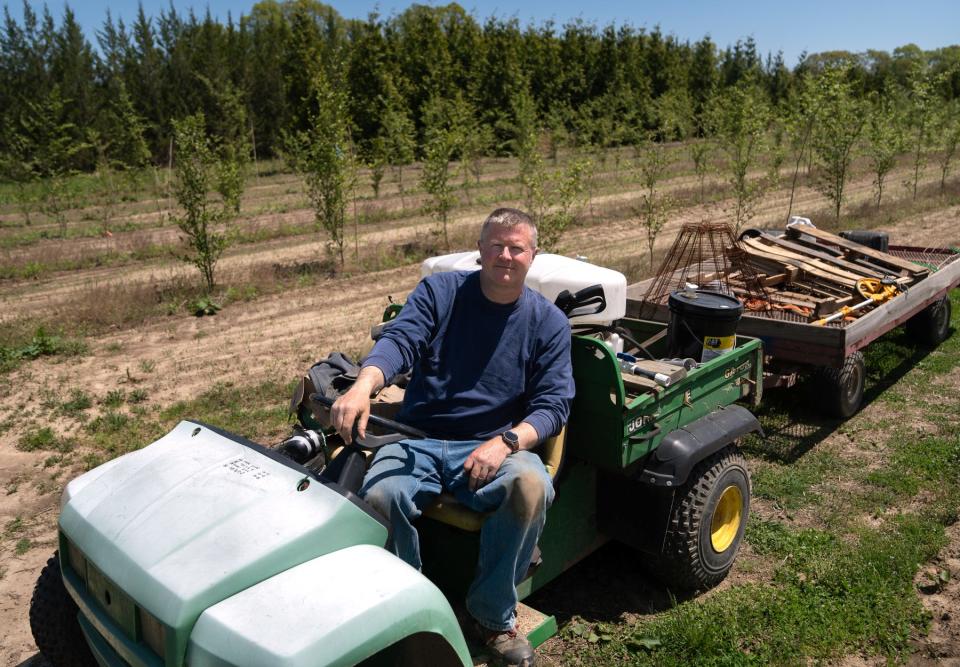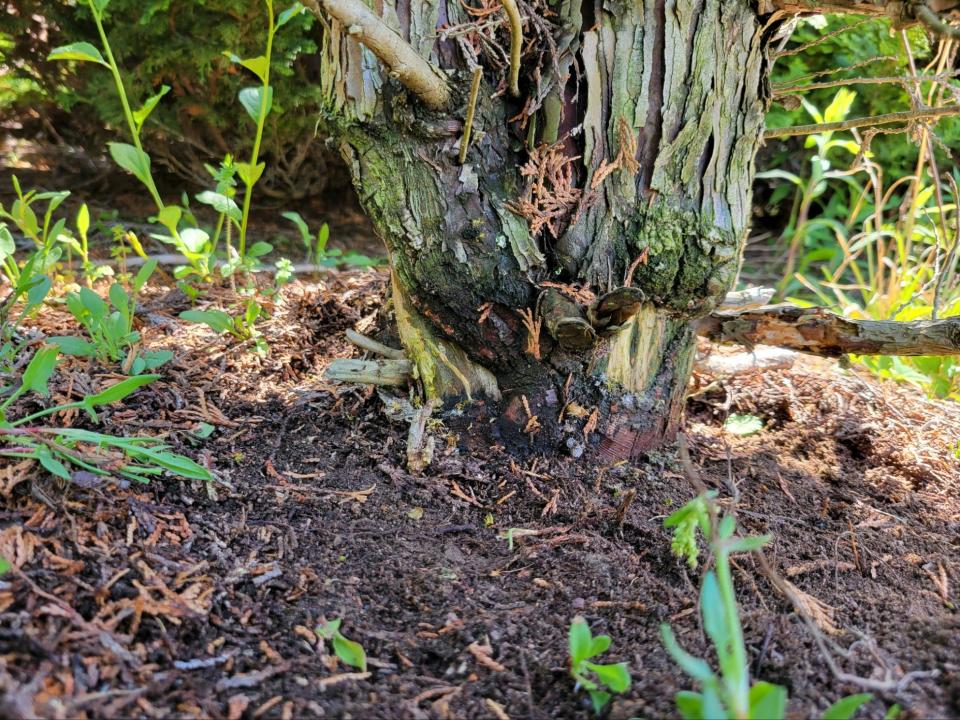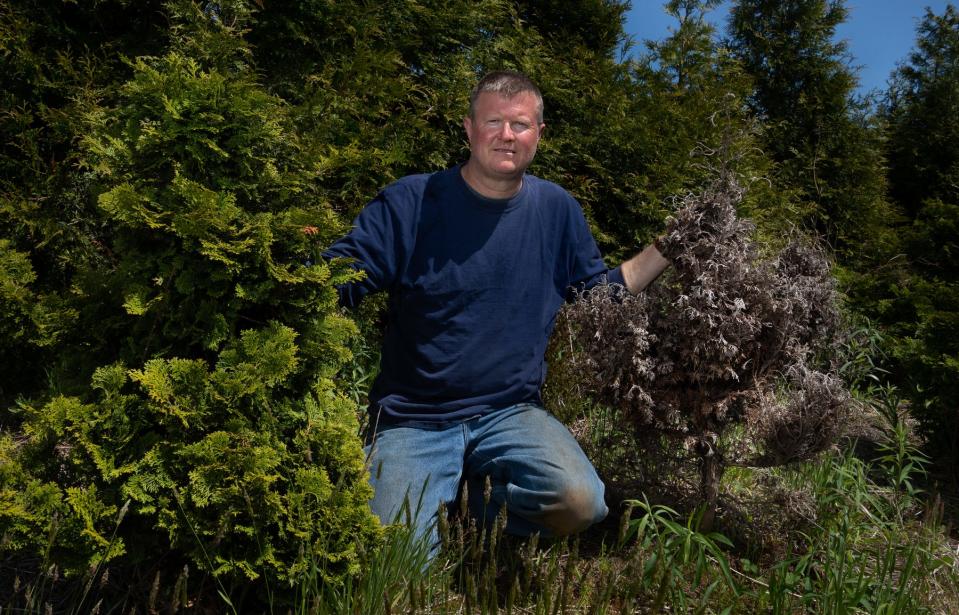This SK farmer is begging people to stop dumping rabbits at Tuckertown Park. Here's why.
SOUTH KINGSTOWN – Ian Stewart is begging people to stop dropping rabbits off in Tuckertown Park.
He knows it seems comical. He'd be laughing, too, if the rabbits weren't causing thousands of dollars of damage each year at Stewart Nursery, his family's business.
"It’s like something from an Alfred Hitchcock movie," Stewart told The Providence Journal. "They’re everywhere."
The tree and shrub nursery, which neighbors the 65-acre park, is in its 91st year of business. Rabbits, like deer, have always been a nuisance. But about 10 years ago, Stewart and his family started noticing that something was different.

"My father had seen it all, and even he was like, 'What in the world is going on? I’ve never seen so many rabbits,'" Stewart said. "When an 88-year-old guy goes, 'I’ve never seen so freaking many rabbits in my life,' you start taking note."
Rabbits, of course, are famous for multiplying at a ludicrous rate. But Stewart wasn't noticing more baby bunnies. These were "full-grown, cat-sized" rabbits, he said.
They appeared out of nowhere, looked well-fed, and weren't afraid of humans. If he put down a pile of brush and came back to pick it up a few days later, 15 rabbits would come running out of a brand-new nest.
The lightbulb finally came on one day when Stewart was chatting with a "nice little old lady" at the bank, who brought up how much she loved Tuckertown Park.
"That park is the best," Stewart recalls her saying. "I've dropped off 26 rabbits there."
More: Long hours. No time off. Little money. RI's young farmers have to adapt to survive. Here's how.
'Humane' approach is actually illegal
In retrospect, Stewart said, it all seems so obvious.
Tuckertown Park, which is less than a 10-minute drive from downtown Wakefield, has soccer fields and a playground, but is also home to a large wooded area that overlooks a pond. It's exactly the kind of place where a misguided but well-meaning person would release an unwanted animal, assuming they'd go on to live a happy life.
"My mom spent half her life bringing cats to the animal shelter, because people just drop them off," Stewart said.
The woman at the bank told Stewart that all her friends brought rabbits to Tuckertown Park, too, he said. He pieced together what was going on: People were fed up with rabbits eating their plants, but weren't about to "run around killing rabbits with a baseball bat."
Instead, they were capturing them with humane traps and depositing them right outside of town.
Capturing and relocating wildlife is illegal in Rhode Island, Stewart noted, though he doesn't want to get anyone in trouble. He would simply prefer they take their rabbits somewhere else.
"To me, personally, if you brought the rabbit further out of town, I could give two hoots," he said.
A costly problem
Tuckertown isn't the only park where people illegally dump unwanted wildlife, of course. It's just a particular nuisance for Stewart.
"For what we do in the nursery industry, rabbits and deer are the main problem," he said. "The deer eats the top of the tree, and the rabbit eats the bottom."

During the warmer months of the year, the rabbits "just eat weeds and don't cause a problem," Stewart said. But during the winter, they hide out under evergreen trees that offer shelter from predators like hawks, eagles, owls and ospreys.
And they get hungry.
"Especially after the first frost, you’ve got a rabbit with nothing to eat, and there are too many rabbits in the first place," Stewart said. "So they eat the bark all off the bottom."
Stripping all the bark from the base of a tree eventually kills it, a phenomenon known colloquially in the business as "weedwhackeritis," Stewart said.
"It’s like, 'Yep, that’s a $600 tree, completely useless because rabbits sat under there all winter and went to town,'" he said.

Stewart would like to try to fence his whole property off, "but it’s crazy expensive and it’s just not that easy," he said. Besides, he doesn't think it would keep the rabbits out. For now, he allows people to bring in dogs to hunt them, and he's hoping to persuade the town to put up signs telling people not to dump wild animals in Tuckertown Park.
"You lose a tree here and there, that’s part of the business," he said. "But I just can’t handle a whole town’s rabbits."
This article originally appeared on The Providence Journal: South Kingstown farmer claims dumped rabbits are devastating his business

